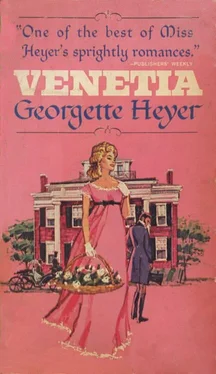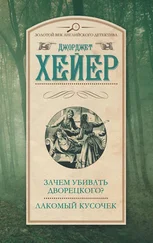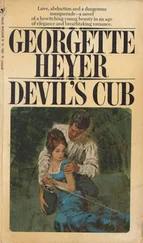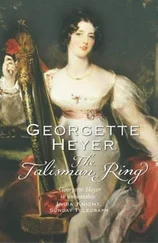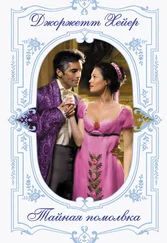Джорджетт Хейер - Venetia
Здесь есть возможность читать онлайн «Джорджетт Хейер - Venetia» весь текст электронной книги совершенно бесплатно (целиком полную версию без сокращений). В некоторых случаях можно слушать аудио, скачать через торрент в формате fb2 и присутствует краткое содержание. Год выпуска: 1958, Жанр: Исторические любовные романы, на английском языке. Описание произведения, (предисловие) а так же отзывы посетителей доступны на портале библиотеки ЛибКат.
- Название:Venetia
- Автор:
- Жанр:
- Год:1958
- ISBN:нет данных
- Рейтинг книги:3 / 5. Голосов: 1
-
Избранное:Добавить в избранное
- Отзывы:
-
Ваша оценка:
- 60
- 1
- 2
- 3
- 4
- 5
Venetia: краткое содержание, описание и аннотация
Предлагаем к чтению аннотацию, описание, краткое содержание или предисловие (зависит от того, что написал сам автор книги «Venetia»). Если вы не нашли необходимую информацию о книге — напишите в комментариях, мы постараемся отыскать её.
Venetia — читать онлайн бесплатно полную книгу (весь текст) целиком
Ниже представлен текст книги, разбитый по страницам. Система сохранения места последней прочитанной страницы, позволяет с удобством читать онлайн бесплатно книгу «Venetia», без необходимости каждый раз заново искать на чём Вы остановились. Поставьте закладку, и сможете в любой момент перейти на страницу, на которой закончили чтение.
Интервал:
Закладка:
She had never been in love; and at five-and-twenty her expectations were not high. Her only acquaintance with romance lay between the covers of the books she had read; and if she had once awaited with confidence the arrival on her scene of a Sir Charles Grandison it had not been long before commonsense banished such optimism. In the days when she had now and then attended the Assemblies in York she had attracted a great deal of admiration, and more than one promising young gentleman, first struck by her beauty and then captivated by her frank manners and the charm of her smiling eyes, would have been very happy to have followed up a mere ballroom acquaintanceship. Unfortunately there was no possibility of following it up in the accepted mode, and although several susceptible gentlemen inveighed bitterly against the barbarity of a parent who would permit no visitor to enter his house, none of them was so deeply heart-smitten after standing up with the lovely Miss Lanyon for one country-dance as to cast aside every canon of propriety (as well as to the horrid dread of making a great cake of himself) and ride out of York to Undershaw, either to hang about the gates of the Manor in the hope of achieving a clandestine meeting with Venetia, or to force his way into the house.
Only Edward Yardley, Sir Francis’s godson, had been accorded tacit permission to cross his threshold. He was not made welcome, Sir Francis rarely emerging from his book-room during his visits, but since he was permitted to walk, talk, and ride with Venetia it was generally believed that an offer from him for her hand would be accepted by her morose parent.
No one could have described him as an impatient lover. Venetia was the magnet which drew him to Undershaw, but it was four years before he declared himself, and she could almost have believed then that he did it against his better judgment. She had no hesitation in declining his offer, for however much she might value his good qualities, and however grateful she might be for the various services he performed for her, she could not love him. She would have been glad to have continued on the old terms of friendship with him, but Edward, having at last made up his mind, was apparently as determined as he was confident. He was not at all cast down by her refusal; he ascribed it variously to shyness, maiden modesty, surprise, and even to devotion to her widowed father; assured her kindly that he perfectly understood such sentiments and was content to wait until she knew her own heart; and began from that day to develop a possessive manner towards her which provoked her very frequently to run directly counter to his advice, and to say whatever occurred to her as being most likely to shock him. It did not answer. His disapproval was often patent, but it was softened by indulgence. Her liveliness fascinated him, and he did not doubt his ability to mould her (once she was his own) to his complete liking.
When Sir Francis died, Edward repeated his offer. It was again refused. This time he was more persistent, which Venetia had expected. What she did not expect was that he should suddenly suppose that her continued reluctance to accept him sprang from what he called the peculiar delicacy of her situation. He said that he honoured her for scruples which she privately thought absurd, and would forbear to press her for another answer until Conway, her natural protector, came home. What should have put such a notion into his head she was at a loss to discover, only two possible solutions presenting themselves to her puzzled mind: the first, that while he was strongly attracted to her he was by no means convinced that as his wife she would add to his comfort; the second, that his mother had suggested it to him. Mrs. Yardley was a colourless little woman, always submissive to his will, and kindling to mild warmth only in his presence. She had never been other than civil to Venetia, but Venetia was quite sure that she did not want Edward to marry her.
With the news that there was a very real hope that the Army of Occupation would soon be withdrawn from France the problem of the future had drawn suddenly close to Venetia. As she walked through Undershaw’s small park she turned it over and over in her mind, but to no good purpose, as she ruefully acknowledged to herself. So much rested upon conjecture, or, at the best, possibility, the only certainty being that when Conway returned Edward would expect a favourable answer to his suit, and would not easily be persuaded to accept any other. That was her own fault, of course, for having been too ready to seize the respite offered by his peculiar notion of propriety; and to agree, even if only tacitly, that nothing could be decided until Conway came home. Edward could hardly be expected to understand that her answer must depend largely on what Conway meant to do. There had been a rather sentimental girl-and-boy attachment between Conway and Clara Denny before he joined, to which Clara at least seemed to attach importance. If Conway attached an equal importance to it she would find herself with a sister-in-law all too ready to resign the conduct of her household into the hands of one whom she had all her life regarded with humble admiration. That, thought Venetia, would be very bad for her, and very bad for me too, but I don’t think I could play second fiddle to poor little Clara at Undershaw!
Marriage to Edward would be safe and comfortable. He would be a kind husband, and he would certainly shield her from inclement winds. But Venetia had been born with a zest for life which was unknown to him, and a high courage that enabled her to look hazards in the face and not shrink from encountering them. Because she did not repine over her enforced seclusion Edward believed her to be content, as he himself was content, to pass all her days under the shadow of the Cleveden Hills. So far from being content she had never imagined that this could be her ultimate destiny. She wanted to see what the rest of the world was like: marriage only interested her as the sole means of escape for a gently-born maiden.
In fact, thought Venetia, as she emerged from the park on to a narrow lane which separated it from the neighbouring estate of Elliston Priory, my case is clearly past remedy, and I’ve nothing to do but decide whether to be an aunt to Conway’s children, or a mother to Edward’s—and I have a lowering presentiment that Edward’s children will be dreadfully dull, poor little things! Where’s that wretched dog? “Flurry! Flurry !”
After she had been calling for several minutes, in growing exasperation, her canine friend came galloping up, full of amiability, his flanks heaving, and his tongue lolling. Being considerably out of breath he was so obliging as to remain within her sight until, a few hundred yards down the lane, she entered the grounds of the Priory through a turnstile set beside a heavy farm-gate. This gave access to an ancient right of way, but Venetia, on excellent terms with Lord Damerel’s bailiff, was at liberty to roam where she liked on his domain, as Flurry well knew. Refreshed by the brief interlude on the lane he raced ahead, in the direction of the woods which straggled down a gentle declivity to the stream which wound through the Priory’s grounds. Beyond the stream lay the Priory itself, a rambling house built in Tudor times upon the foundations of the original structure, subsequently enlarged, and said to be replete with a wealth of panelling, and a great many inconveniences. With the house Venetia was not concerned, but the grounds had for years been the favourite haunt of the three young Lanyons. Sir Francis’s vagaries had not led him to neglect his estate, which he kept in excellent order. His children preferred to seek adventure in less neat surroundings. The Priory woods, which partook of the nature of a wilderness, exactly suited youthful ideas of what was delightful; and if Venetia, grown to maturity, felt it to be a pity that the place should be neglected, it still held its charm for her, and she frequently walked there, and, since its owner rarely came near it, could allow the disobedient Flurry to range at will, chasing rabbits and flushing pheasants without danger of drawing wrath down upon his head. The Wicked Baron, as she had long ago christened Lord Damerel, would neither know nor care: the only party he had ever brought to the Priory had certainly not been a shooting-party.
Читать дальшеИнтервал:
Закладка:
Похожие книги на «Venetia»
Представляем Вашему вниманию похожие книги на «Venetia» списком для выбора. Мы отобрали схожую по названию и смыслу литературу в надежде предоставить читателям больше вариантов отыскать новые, интересные, ещё непрочитанные произведения.
Обсуждение, отзывы о книге «Venetia» и просто собственные мнения читателей. Оставьте ваши комментарии, напишите, что Вы думаете о произведении, его смысле или главных героях. Укажите что конкретно понравилось, а что нет, и почему Вы так считаете.
